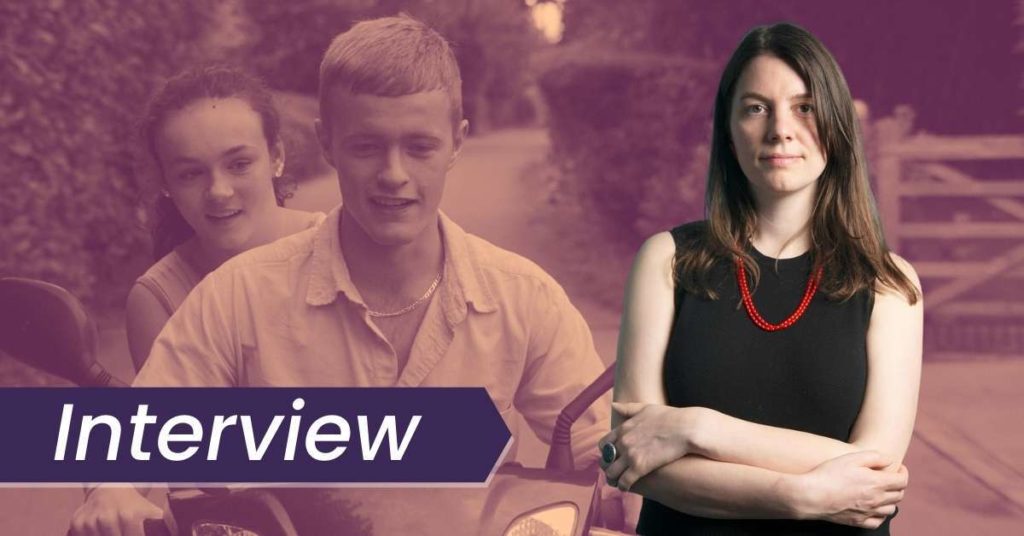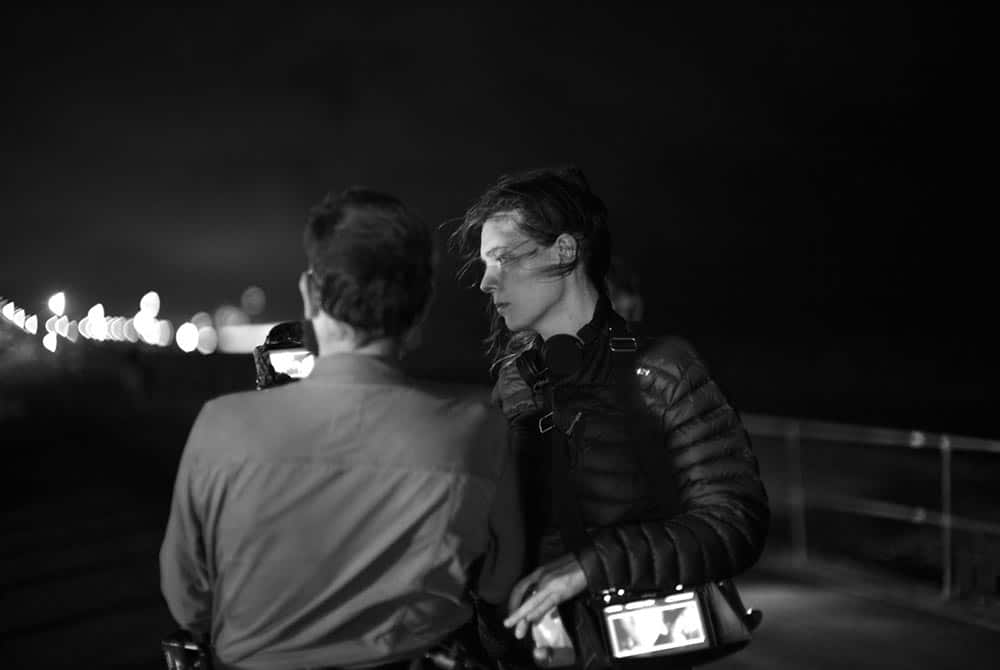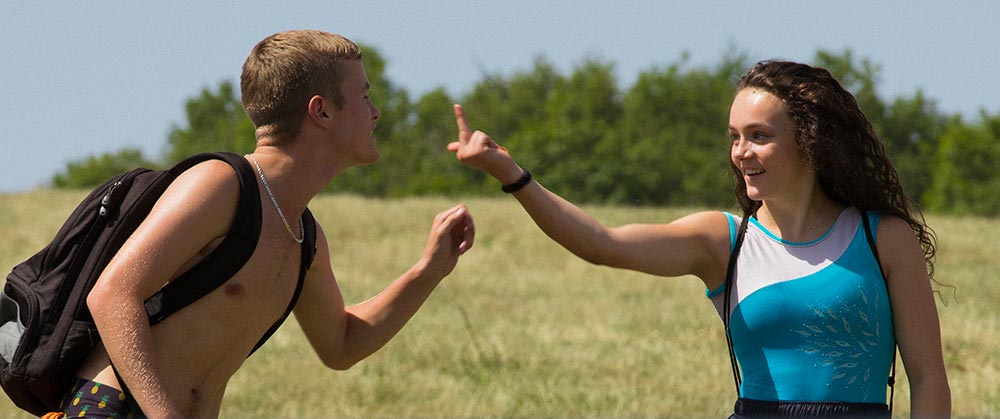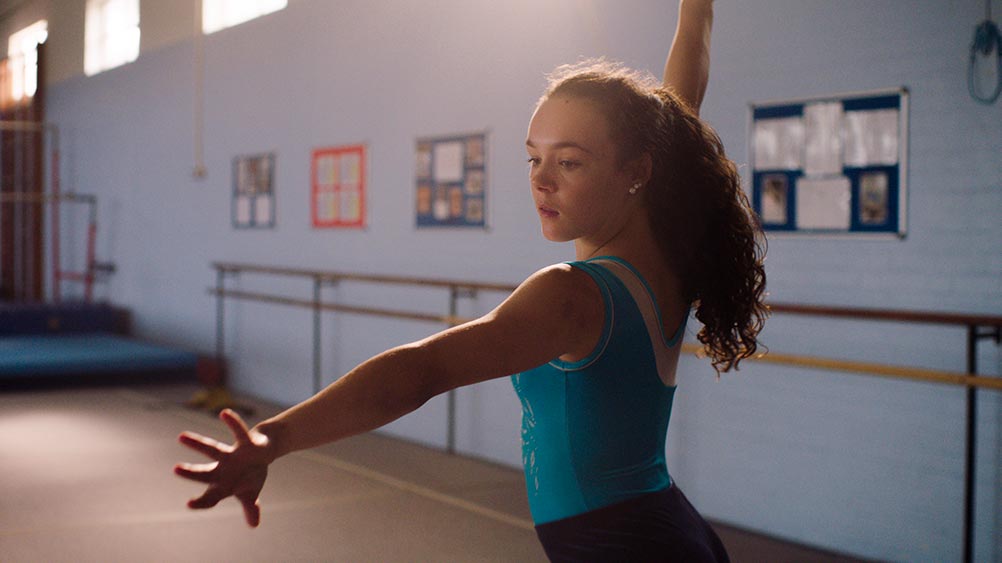Writer-director Eva Riley on Perfect 10’s tumultuous journey from script to screen, and how she realised she wasn’t making a sports or a crime movie but a story about a brother and sister reuniting.

Despite being about a gymnast and named for a perfect score in the sport, Eva Riley’s feature debut, Perfect 10, isn’t a sports film at all. Riley establishes early on in the film that protagonist Leigh (Frankie Box) is training for a gymnastics competition the next week. She practices her routine several times to varying degrees of success, as if to imply the film is building up to a grand finale performance at the competition itself. But Riley never shows us the competition, because her film isn’t about that. The real story of Perfect 10 is of Leigh meeting and bonding with her estranged older brother, Joe (Alfie Deegan), an aimless young man involved in motorbike crime. It sneaks up on you and warms your heart.
Perfect 10 reminded me of Nora Fingscheidt’s System Crasher, an excellent and gut-wrenching German film that was released in the UK earlier this year by 606 Distribution, who also distributed Perfect 10. Both films are about rebellious young women who have been failed by the lack of a social support system. In Leigh’s case, she’s a working class girl in suburban Brighton who has been left without adult supervision; her mother recently died, and her father is never around. Joe arrives into her life, and they form a sweet bond. He tries to fill the parental gap, but he doesn’t always know what Leigh needs and wants, or why she lashes out. And he doesn’t have the funds to support them both. With a keen, empathetic eye, Riley observes how this kind of codependent relationship is inevitably toxic, even though Leigh and Joe love each other very much.
The reason Riley spends time on Leigh doing gymnastics is not to present her as an example of exceptionalism, as a traditional sports film might, but to show she’s a girl with dreams and a future. The film is a bittersweet look at how love and support can give a struggling young person a future, but without higher level support, many will still fall through the cracks. Leigh might one day have a life beyond her small, Brighton town, thanks to the support of Joe and her kind trainer, Gemma (Sharlene Whyte); meanwhile, Joe doesn’t have anyone looking out for him.
I spoke to Riley over the phone about navigating the leap from shorts to a first feature, the benefits of making a film in your hometown, and her unconventional method of working with non-professional actors.

Seventh Row (7R): Where did the idea come from to combine gymnastics with the story of a brother and sister connecting with each other?
Eva Riley: The original idea came from wanting to make a movie about a brother and a sister. I was throwing out lots of different ideas for that. I wanted each of them to have their own passion in life. At the time, for some reason, I was watching lots of YouTube videos about gymnastics, and I kind of got obsessed with floor routines, and also Nadia Comăneci, who did the perfect 10 score at the Olympics in 1976. Originally, I wanted to make it about a girl who was obsessed with Nadia Comăneci, because at the time, I was. That’s how it came to be the focus of Leigh’s life.
Then, I discovered a lot about motorbike crime, and that became Joe’s passion. It just came out of wanting them to have a focus in their own lives, something they were excited about. Then it became this very complicated idea because I had a brother and sister relationship, gymnastics, and motorbike crime, so the next thing was just finding a much simpler story through that.
7R: I found the structure of the film really interesting. Traditionally, in a sports movie, the film would lead up to the gymnastics competition that Leigh and her trainer talk about her competing in the next week, but Perfect 10 ends days before the competition. It’s not really about that.
Eva Riley: The script went through so many permutations, you would not believe. At one point, I was trying to make it a real classic sports film, which had a competition scene at the end. It was very complicated writing the script. I was used to making very simple shorts, and suddenly, there was so much to deal with in this script. It was about bringing it back to a simple story.
One of the biggest changes was to make it not a competition film anymore and just make it about these two kids. I said to myself, “OK, this film is actually about two kids getting to know each other while they do a series of crimes, and there’s a backdrop of sports to that.” Once I had that in my head, it was so much easier.
7R: For how long was this script in draft?
Eva Riley: Oh, for just years. Such a long time. I started in 2015, throwing around an idea with Jacob Thomas who was one of the first producers on it. Then, we got onto iFeatures in 2016, so we were doing passes on the treatment and then passes on the script for that. We got greenlit in early 2017.
When I got the greenlight, I was like, “OK, this is going to be made now. I need to make it into a script that I definitely want to make, and I need to make it manageable as a director.” 2017 and 2018 was really hard graft. I spent a lot of time working on it with different script editors.
In the beginning, people would recommend that I watch sports films or crime films. They were good, but looking back, they weren’t actually my type of films at all. Watching I May Destroy You recently, there was a really interesting episode talking about the different ways that your script can go in your head. It can become very dramatic or genre-y, or it can become something more low key. There was a time when I was really throwing that around.
At the end of 2017 to 2018, I started to really understand what this was about, and also, I started very early casting for the film, which helped an awful lot. I was also doing a lot of research in Brighton, meeting people who were involved in gymnastics and motorbikes, and that just helped so much for the details. For instance, [for the scene] at the end of the film, the whole concept of [friends and family] being behind a window at the gymnastics club [and watching the girls train through that window] came through me being at a gymnastics club and realising that that was something that was there. That became a central thing to the film.
7R: Where did the Brighton setting come from?
Eva Riley: I live in Brighton. Primarily, I thought it would be much simpler for production and research. I don’t like to make a film unless I feel like I’ve got my head around the stuff in it.
I’m from Edinburgh, and it’s a very different landscape up there from down here. I was kind of falling in love with a lot of it, the really English, Brighton countryside and the suburbs around Brighton. It gave me a chance to explore, to go and cycle around on my bike and say, “Can I come and visit your youth club?” and just chat to people. I could do that stuff over quite a long period of time.
Around Brighton is really beautiful, aside from the normal touristy things that people think of. People have an idea of Brighton in their heads, like central Brighton, but the outskirts and around it are quite different from what people think of normally.
7R: This is the first feature for both of your lead actors. Was it always your intention to cast nonprofessional actors?
Eva Riley: I always thought they would be because I really wanted them to be actually young, and the likelihood is that they’re going to be less experienced at that age. I had a really good casting director, Lucy Pardee, who’s just amazing at street casting.
For Leigh, we met mostly first-time actors because they had to be a gymnast. For Joe, we met some young guys who had maybe been in a film or a TV episode before or trained. We met Frankie and Alfie really early. I filtered them out quite early on, thinking they were quite interesting, but there were lots of other people in the mix.
Then, we started to do chemistry tests where we paired up different boys and girls, and it was pretty clear early on that Frankie and Alfie had great chemistry. They just really liked each other. They had this brotherly and sisterly thing going on, and they also shared the same kind of slang. It was really funny. They would be really excited about the fact that they said things the same way. It made it really easy. They were constantly riffing off each other and having a laugh.
7R: Did your conception of the characters from the script change much after you cast them?
Eva Riley: Even before I [officially] cast them, to be honest. I met them both probably in October 2017, and then had an audition-type thing in January 2018. I think they were only cast in May 2018. It has to go through a whole process where execs sign things off and stuff. Also, I wasn’t totally sure. It’s a very scary thing to cast first-time actors in a film because you have to really know they’re going to be able to carry it. Even though I hadn’t finalised [their casting, they impacted the characters].
Especially Alfie, actually. The character of Joe really started to take shape in my head once I met Alfie. He’s just something else, such an amazing young guy. I think Frankie was already quite close to what I’d imagined Leigh to be, but with Alfie, he really helped. He’s such a chatterbox, so full of energy and life. That really helped me to think that Alfie is the kind of person who would bring someone to life if he was hanging out with them. He’s got a really brotherly, caring side to him, and that brought that out in my script, as well.
7R: Since they hadn’t been on camera before, how did you work with them to help them feel comfortable in front of a lens? How did you help them build their relationship in front of a camera?
Eva Riley: They were so confident already. They just blew my mind. Both of them stood out so much for how confident they were in the auditions. There wasn’t a huge amount of worry with that. Although obviously, they had their own insecurities, so I had to explain to them how things would work.
I think the fact that they had a lot of auditions together was really helpful because I really taxed them a lot in that process so they got to know each other.
I had a series of rehearsals with each of them individually. I didn’t want to rehearse them too much together once they’d been cast because they’re not meant to know each other in the film. I didn’t want them to get too used to each other. So we had individual rehearsals. Frankie had rehearsals with Will [Ash], who plays her dad, and also a woman that I cast as her mother even though the mum’s not in the film. Alfie had rehearsals with a woman who plays his mum even though we don’t see her in the film. I would film all these rehearsals.
It was generally just me and the actors, nobody else. I would just get them used to taking direction because that’s quite a difficult thing, to be adjusted. If you’re a first time actor, and someone gives you a direction, you can feel like you’re doing something wrong. A lot of it was about explaining that it’s not about doing anything wrong; it’s about playing around and finding the characters.
I got them to meet some of the team early on so when it came to the first day, they’d met people, and it wasn’t so scary to have everyone looking at them. On the first day of shooting, I think I saw a little bit of worry in their eyes, but it very quickly went. There’s just so many people on set. I get surprised when I see how many people are on set. I try to keep it as small as possible.
7R: How did you go about building your team?
Eva Riley: It’s so important to me. Like I say, I’m so shocked by how many people are on set. You just need these touchstones, people on the crew you know really, really well. I wanted to feel supported. I’ve made quite a few shorts, and I’ve had various experiences, good and bad.
It was really important to me that I was very close with my DP. I ended up working with Stephen Cameron Ferguson, whom I knew from film school. He did an interview, and I thought he was amazing. He’s so passionate about filmmaking, and he was so passionate about the story, as well. I just knew that if anyone was going to be my right-hand person, it was going to be Stephen.
For people who I took on board who I hadn’t worked with before, it was just about having a really, really honest chat, getting through that surface level chit chat and getting them to understand how I work. I have realised, through making films, that I work slightly differently from other people. I like to improvise, and I like to keep things small. It was about really asking if they understood that this was how I wanted to work and what they thought about it. Some people seemed a bit confused, and some seemed excited. Anyone who seemed excited about the way I wanted to work and working with first time actors was a good sign to me.

7R: Could you describe the way you work and the improvisational element of it?
Eva Riley: It’s something I’ve come to through my shorts, so it wasn’t something I always did. I just really, really love actors improvising within a take. And when I say improvising, I don’t mean making up story on the spot at all. It’s structured so that they’ve read the scene, they know the shape of the dialogue, and they know the turning points of the scene, but I don’t like them to overread the scene. I basically just say to them, “If you are not feeling these lines, just say something else.” I’m always asking actors to surprise me, do something different, and take it off in a different direction. That happens in some scenes more than others.
For instance, with the scene when they’re [Leigh and Joe are] in the forest and they’re eating apples and Leigh’s talking about her mum who’s died, we did so many takes of that. I just let them talk and talk and talk. Some takes were 15 minutes long, just because it was a really tender scene, and I wanted to get these little moments of spontaneity. Some crew were looking at me like, “Oh my God, what are you doing,” because it does seem a bit crazy, but I’m very, very confident in it now. You always get these gems.
Usually, the first few takes are not so good, because they can be a bit awkward while people are getting into the rhythm of it. But when you change it and give [the actors] the licence to say it exactly how they want, you get these moments of magic.
Once we’ve got that, I say, “OK, let’s do something a bit closer,” and sort of build on that idea we got in the wider take. It’s just building a scene. When actors do a real laugh, it’s so beautiful. Frankie and Alfie are so funny; they make me laugh so much, and they make each other laugh so much. There’s also a scene when they’re walking down the street and Frankie is doing a fake catwalk, and I loved it because I didn’t write any of it! I just said walk along the street or whatever, and they made stuff up on the spot. That’s just beautiful.
7R: I loved the relationship between Leigh and her trainer, Gemma. How did you work with actress Sharlene Whyte to work out who that woman was?
Eva Riley: That was a tricky one because I’d watched a lot of sports films with these terrible, clichéd portrayals of coaches, and I really wanted to get away from that. I met lots of different women. Sharlene, who plays Gemma, I’d worked with before on a short film, so I suddenly thought of her, got her in for an audition, and then thought, “OK, amazing.” It was a bit more written, her part, because I find adult actors generally like to stick to the script a bit more.
It was just about talking to Sharlene about backstory. Sharlene actually was a gymnast, which I didn’t realise. It was really interesting talking to her about her relationship to her coach, and talking to her about the things she sees of herself in Leigh.
I find coaches really fascinating. I’d been to many gymnastics clubs and met loads of coaches. At the club we shot at, the coach was a really interesting character, so I got Sharlene to sit in on a couple of lessons. It’s all about these little tidbits that you pick up. There was something really interesting that Sharlene picked up in the lessons about how the coach was really strict but also really loving with the girls. Sharlene knows what she’s doing so I kind of let her go off and create the character herself.
I also got her to meet Frankie. She loves Frankie; everyone loves Frankie. They just spent some time together. I remember Sharlene saying it’s not very hard to fall in love with Frankie. There was a genuine warmth between them.
7R: How did you work with your cinematographer, Stephen Cameron Ferguson, to devise the film’s visual language? I really loved how the camera gives us such a clear sense of where Leigh is at emotionally, especially in group scenes.
Eva Riley: Me and Stephen are just so close. He’s such a joy to work with. We spent hours and hours and hours together beforehand. He came down to Brighton and spent so much time scouting for locations. I find it really interesting to scout for locations with a DP, because it just makes you think about landscape.
We had this ridiculously huge moodboard. It was just insane, like a scene-by-scene breakdown with visual ideas. We had our own little series of images we looked at, and every scene got talked about in terms of where Leigh was at emotionally. Something I liked to do at film school that really helps me is to take every scene and ask myself, What is going on in this scene? What is the character going through? How can we visually sum this up?
Me and Stephen both watched a lot of films from different countries and time periods. We had really wide-ranging references. For one scene, we had a shot from Clueless, which was a completely different kind of film, but it didn’t matter, because it’s just about the energy of that moment.
On set, because we’d done so much work together, we didn’t have to talk too much about [our ideas]. But if we ever got stuck, we could just huddle together and talk about the scene. We both really trust each other, so sometimes, I was just like, “OK Stephen, what we’d planned is a really bad idea, let’s reassess.” I teach film to students sometimes, and I say, “You can have a plan, but you have to throw it away if it’s not working on set.” When you have the actors on set and you’re blocking something, it’s a different kettle of fish to when it’s in your head, at home, writing at a desk.

7R: How did you work out how to shoot the gymnastics scenes?
Eva Riley: We had a really nice relationship with the club, and we spent a lot of time there, watching other gymnasts do their routines. We’d sit in on a class and watch them doing their stuff, and also talk about what’s going on emotionally.
A lot of the film is about Leigh being emotionally stuck, protecting herself, and being scared to let herself go and also feeling very unconfident. In a way, it bled over from another short we’d done called Diagnosis, which was about another character who was emotionally repressed in a different way. When she’s [Leigh is] really stuck, the gymnastics is really stuck. For instance, the first time she does it, I think we had the camera on a tripod with a zoom lens.
I spoke to a lot of girls, and they said that when you’re not feeling it, it’s like everyone’s watching you, and you feel so awkward. You’re incredibly vulnerable, as a gymnast. You’re standing there in a leotard, you’re kind of half dressed, about to do something incredibly physically demanding, and it’s very embarrassing when you fall. But when I would ask them how it felt when you were doing well, it was so beautiful the way they summed it up. They said it was like you were flying, like you’re free. One day, Stephen just said, “For the final scene, I’m going to run around the gymnastics floor with her,” and he did. He was absolutely exhausted by the end of it.
7R: How did you conceptualise the sound design in the film? In the gym scenes, the sounds of other people feel so present when Leigh is self-conscious. The sound is such an important part of how we get into Leigh’s head.
Eva Riley: Some of those ideas were in the script, just about her feeling paranoid and anxious. The gymnastics club is a very loud space, and you can hear stuff on the other side of the huge hall. She feels like people are kind of on top of her and talking about her. We did a lot of wild tracks with all the parents who are watching. That’s a thing that happens: when I was there at the gym, I saw all the parents watching the class and thought it must be so intense for the girls.
What was also really important was the floor music, the piece of music she dances too. I spoke a lot with the sound designer, just talking about how that music sounds depending on what stage she’s at. At the beginning, it’s very tinny, like it’s coming from a far-away speaker; at the end, it’s very present. It was all written in the script, which is something I do naturally because I’m always thinking very subjectively about the character. I think it was quite easy for the sound people to understand what I wanted.
7R: What are you working on next?
Eva Riley: Another film about teenagers. I love teenagers. It’s called The Circle currently, although that might change. It’s about a girl called Charlotte who’s a 15-year-old, like a young Conservative, I guess. She moves from quite a fancy area to quite an ordinary area in Edinburgh for reasons we don’t quite understand at the beginning of the film, and she moves to this urban Scottish state school. She feels very lost, makes friends with these very nerdy, outsider girls nobody really likes, and they have a series of sleepovers at her very big house. She kind of creates a cult. Not like she intends to from the beginning, but she realises these girls really look up to her, and it becomes a cult-like following.
It sounds very dark, but actually, it’s basically an absurdist comedy. A simple way to describe it is like Lord of the Flies but with teenage girls. It’s a black comedy. I’ve just written the second or third draft. It really makes me laugh. It’s about teenage girls on sleepovers which is a really funny thing to me because I remember doing that a lot when I was young. It’s just about being young and feeling like you know exactly how the world works, and the ritualistic nature of female bonding. I’m not poking fun at that at all. I think it’s a very beautiful thing. But it’s also, in a way, talking about the world [as a whole] through teenage girls. It’s like a parable.
Perfect 10 will be released in UK cinemas and on Curzon Home Cinema this Friday 07/08.

